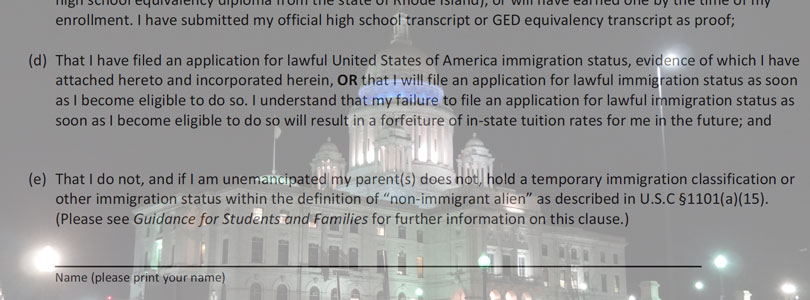Activists and Lawmakers Set to Challenge In-State Tuition for Illegal Aliens
Since the Rhode Island General Assembly has never passed legislation that allows illegal aliens to receive in-state tuition, a state higher education board appears to be operating in violation of federal law, according to a letter submitted to the attorney general in February.
Now lawmakers are preparing another bipartisan letter claiming that the attorney general has failed to fulfill his “statutorily-mandated duty” by declining to offer a meaningful response to their first inquiry.
In Sept. 2011, the Board of Governors for Higher Education voted unanimously in favor a policy that makes in-state tuition available to illegal immigrants who have graduated from a Rhode Island high school after attending that same school for at least three years. The one caveat is that they must seek legal status. Lawmakers who are opposed to the policy intend to offer new legislation in the 2013 session.
There is a substantial difference between in-state and out-of-state tuition. In-state tuition at the University of Rhode Island, for instance, is about $10,000 as opposed to nearly $26,000 for out-of-state students who are legal American citizens. The board’s actions in Rhode Island back into a larger national debate.
There are currently 12 states that allow illegal aliens to pay the same lower tuition rate offered to legal in-state residents, including neighboring Connecticut. But they are doing so in violation of a federal law that President Clinton signed off on in 1996, according to a report from the Heritage Foundation. In addition to undermining the rule of law, the offending states are undercutting their own financial standing, the report says.
The letter addressed to Attorney General Peter Kilmartin, co-signed by 23 state senators, asks for an “advisory opinion” to be issued that clarifies whether or not the board’s actions are permissible in the absence of new legislation from the General Assembly.
“It appears us the Board of Governors’ new policy cannot be reconciled with federal law,” the letter dated Feb. 9 2012 says. “…a state may provide that an alien who is not lawfully present in the United States is eligible for any state or local public benefit for which such an alien would otherwise be ineligible under subsection [a] of this section only through the enactment of state law after Aug. 22, 1996, which affirmatively provides for such eligibility.”
Although several bills have been introduced aimed at providing illegal aliens with in-state tuition, none have ever passed the General Assembly.
“The Board of Governors’ adoption of the new policy would appear to violate not only federal law, but also the will of the citizens of Rhode Island as expressed through their elected representatives in Rhode Island,” the letter says.
To date, Attorney General Kilmartin has declined to comment on the substantive question raised in the letter. Sen. Marc Cote followed up with his own letter a few weeks later prodding the attorney general to weigh in on the legalities of in-state tuition for illegal aliens. In a letter addressed to Sen. Cote, dated April 19 2012, Deputy Attorney General Gerald Coyne wrote that a formal request for an advisory opinion could only be made through the senate president.
“Please note that by declining to provide an advisory opinion at this time, this office specifically takes no position with respect to the substance of your request,” Coyne’s letter says. “Rather, the basis for this determination is the process by which such requests are received by this office.”
Sen. Cote, and other lawmakers who signed the initial letter, disagree with the attorney general’s interpretation of its procedural responsibilities. Rhode Island state law makes it clear that the attorney general serves as the legal advisor not just to the leadership of the General Assembly, but also to individual lawmakers, they claim.
Activists with Rhode Islanders for Immigration Law Enforcement (RILLE) have expressed opposition to the board’s policy right from the time of its inception.
“We do not believe that the Board of Governors of Higher Education should be above the law and be permitted to willfully violate federal law with impunity,” Terry Gorman, the group’s president has written. “RIILE recognizes that when government officials knowingly violate federal law, they are safe so long as they know that law enforcement officials will chose to look the other way and to permit these laws to be violated, but history shows that when government officials violate laws or usurp their proper authority they are ultimately held accountable.”
Polls show that over 80 percent of Americans are opposed to the idea of granting in-state tuition to illegal aliens.
“Granting financial preference to illegal aliens also discriminates against otherwise qualified citizen students from outside the state,” scholars with the Heritage Foundation argue in a research paper. “Furthermore, states that offer in-state tuition to illegal aliens act as a magnet for more illegal aliens to come to the state.”
Rep. Doreen Costa is ambitious to reverse the board’s decision. She intends to introduce a new bill in next year’s legislative session that would block illegal aliens from receiving in-state tuition. Costa has also been critical of Gov. Lincoln Chafee for supporting a policy change that was not approved through the General Assembly.



